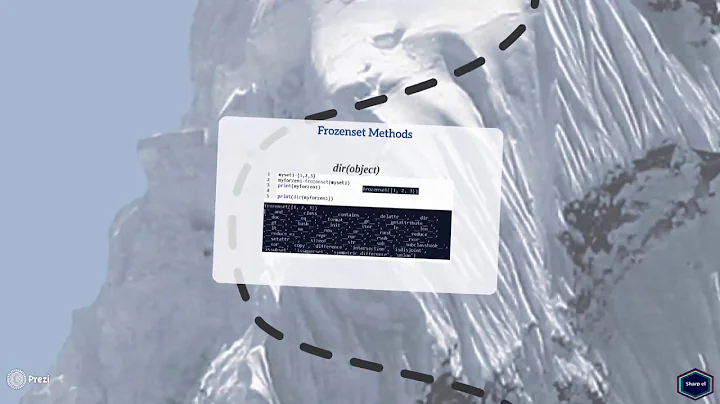How to get an arbitrary element from a frozenset?
Solution 1
(Summarizing the answers given in the comments)
Your method is as good as any, with the caveat that, from Python 2.6, you should be using next(iter(s)) rather than iter(s).next().
If you want a random element rather than an arbitrary one, use the following:
import random
random.sample(s, 1)[0]
Here are a couple of examples demonstrating the difference between those two:
>>> s = frozenset("kapow")
>>> [next(iter(s)) for _ in range(10)]
['a', 'a', 'a', 'a', 'a', 'a', 'a', 'a', 'a', 'a']
>>> import random
>>> [random.sample(s, 1)[0] for _ in range(10)]
['w', 'a', 'o', 'o', 'w', 'o', 'k', 'k', 'p', 'k']
Solution 2
If you know that there is but one element in the frozenset, you can use iterable unpacking:
s = frozenset(['a'])
x, = s
This is somewhat a special case of the original question, but it comes in handy some times.
If you have a lot of these to do it might be faster than next(iter..:
>>> timeit.timeit('a,b = foo', setup='foo = frozenset(range(2))', number=100000000)
5.054765939712524
>>> timeit.timeit('a = next(iter(foo))', setup='foo = frozenset(range(2))', number=100000000)
11.258678197860718
Solution 3
You could use with python 3:
>>> s = frozenset(['a', 'b', 'c', 'd'])
>>> x, *_ = s
>>> x
'a'
>>> _, x, *_ = s
>>> x
'b'
>>> *_, x, _ = s
>>> x
'c'
>>> *_, x = s
>>> x
'd'
Related videos on Youtube
ablondin
Updated on September 16, 2022Comments
-
ablondin over 1 year
I would like to get an element from a
frozenset(without modifying it, of course, asfrozensets are immutable). The best solution I have found so far is:s = frozenset(['a']) iter(s).next()which returns, as expected:
'a'In other words, is there any way of 'popping' an element from a
frozensetwithout actually popping it?-
 bbayles almost 11 yearsI think your method is as good as any. If you want a random element you might check out
bbayles almost 11 yearsI think your method is as good as any. If you want a random element you might check outrandom.sample(fset, 1). -
ablondin almost 11 yearsI just want to get some arbitrary element from a frozenset. I shouldn't have used the word pop since the set remains unchanged. It is similar to peeking the first element of a stack without popping it.
-
user2357112 almost 11 yearsThat's what I use (but with the
nextbuiltin instead of the method). -
Bakuriu almost 11 yearsDon't use the method
.next(). There is anext()built-in function since at least python2.6 and using it means that your code will work also in python3 where thenextmethod was renamed__next__.
-
-
rynemccall over 9 yearsWhy should you call
next(iter(s))rather thaniter(s).next()? -
 Zero Piraeus over 9 years@rynemccall Because in Python 3,
Zero Piraeus over 9 years@rynemccall Because in Python 3,iter.next()doesn't exist. -
A T over 7 years
ValueError: too many values to unpackon set with multiple elements. -
Dominic Kempf over 7 yearsas said, this only works with exactly one element in the frozenset.
-
 wchargin over 4 yearsThe first of these is just a complicated way to write
wchargin over 4 yearsThe first of these is just a complicated way to writelist(my_frozenset), which is quite wasteful for large sets. The second is just a complicated way to writenext(iter(my_frozenset)), which is already the accepted answer.





![23. Sets and Frozen Sets [Python 3 Programming Tutorials]](https://i.ytimg.com/vi/RD6JionMlXM/hq720.jpg?sqp=-oaymwEcCNAFEJQDSFXyq4qpAw4IARUAAIhCGAFwAcABBg==&rs=AOn4CLBVlty8RFTmE2Lq7MJT73tmWC7tPw)


